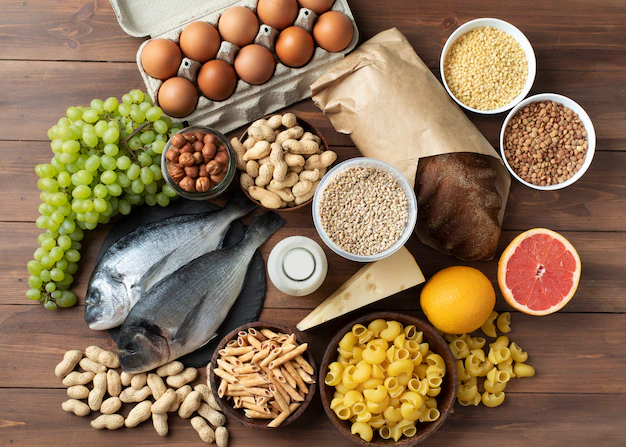This content is for informational and educational purposes only. Always consult a qualified healthcare provider.
Last Updated on February 20, 2024 by Grace Oluchi


Healthy eating means choosing a variety of foods that are good for your body. It involves eating plenty of fruits, vegetables, whole grains, and lean proteins while limiting processed foods, sugary drinks, and unhealthy fats. Also, It’s about finding a balance and enjoying your meals while nourishing your body with the nutrients it needs to stay strong and healthy. In this article, you’ll be able to find ways to eat well, know the benefits, and other vital points.
📋 Table of Contents
Ways To Eat Healthy
Changing the way you eat can do you a lot of good. Let’s look at ways you can start to eat better:
- Consume more fruits and vegetables
- Choose whole grains
- Start eating more proteins
- Slow down on sugary snacks and dessert
- Practice mindful eating
- Limit processed foods
- Drink plenty of water
- Control portion sizes
- Cook at home
- Plan and prepare ahead
Eat more fruits and vegetables
Include a wide range of whole, unprocessed foods in your diet. This includes fruits, vegetables, whole grains, lean proteins (such as poultry, fish, and legumes), healthy fats (like avocados, nuts, and olive oil), and low-fat dairy or dairy alternatives. These foods provide a rich array of essential nutrients.
Choose whole grains
Go for whole grain options like whole wheat bread, brown rice, and whole grain pasta. They are higher in fiber and nutrients compared to refined grains.
Start eating more proteins
Select lean sources of protein such as poultry, fish, beans, lentils, and tofu. These options are lower in saturated fat and provide important nutrients.
Slow down on sugary snacks and drinks
Choose healthier snack options like fresh fruit, nuts, or yogurt instead of sugary treats. If you have a sweet tooth, opt for healthier alternatives or enjoy treats in fair amounts.
Practice mindful eating
Slow down and feel your meals. Pay attention to the flavors, textures, and enjoyment of the food. This helps prevent overeating and promotes a healthier relationship with food.
Limit processed foods
Go easy on your intake of processed and packaged foods that are often high in added sugars, unhealthy fats, and sodium. Opt for fresh, whole foods whenever possible.
Drink plenty of water
Stay hydrated by drinking water throughout the day. Avoid sugary drinks and limit your consumption of alcohol.
Control portion sizes
Be mindful of the size of your food to avoid overeating. Use smaller plates and bowls, and pay attention to your body’s hunger and fullness signs. Eating till you can’t stand or walk is not the right way to live. Always make sure you’re getting just enough food to get through the day.
Cook at home
Prepare meals at home whenever you can. This allows you to have control over the ingredients and cooking methods, reducing the intake of added sugars, unhealthy fats, and high sodium.
Plan and prepare ahead
Plan your meals and snacks in advance to avoid relying on unhealthy convenience foods. In addition, keep nutritious snacks readily available for when hunger strikes.
Remember, making small, slow changes to your eating habits is key to a sustainable healthy eating style. It’s about finding a balance and making choices that work for you and your lifestyle.
Benefits Of A Good Eating Lifestyle
Eating healthy provides many benefits for your overall health and well-being. Here are some of the key benefits that you stand to gain if you start to eat better:
- Better physical health
- More energy
- Stronger immune system
- Better digestion
- Clearer skin and healthier hair
- Happier mood
- Lower risk of weight-related problems
- Better sleep
- Improved concentration
- Reduced risks of diseases
- Long-term health benefits
Better physical health
A balanced diet rich in nutrients supports your body’s proper functioning and helps maintain a healthy weight. It reduces the risk of chronic diseases such as heart disease, diabetes, certain cancers, and high blood pressure.
More energy
Healthy foods provide the energy your body needs for daily activities, exercise, and mental tasks. You’ll feel more energized and alert throughout the day.
Stronger immune system
Eating nutritious foods helps your body fight off illnesses and infections better.
Better digestion
Healthy eating allows good digestion, stopping issues like constipation and discomfort.
Clearer skin and healthier hair
A balanced diet can improve the health and appearance of your skin, hair, and nails, promoting a youthful appearance.
Happier mood
Nutritious foods can positively impact your mood, making you feel happier and more positive.
Lower risk of weight-related problems
Eating well-balanced meals can help you reach and maintain a healthy weight, and lower the risk of high-weight problems such as joint pain, sleep apnea, and metabolic disorders.
Better sleep
Eating healthy can positively affect sleep patterns, helping you fall asleep faster and enjoy a more restful sleep.
Improved concentration
Filling your body with healthy foods can enhance focus, concentration, and cognitive function.
Reduced risks of diseases
Making healthy food choices can lower the risk of developing chronic diseases like heart disease, high blood sugar, and certain cancers.
Long-term health benefits
Taking on healthy eating habits early in life can lead to long-term health benefits, reduce the risk of chronic diseases like heart disease, and diabetes, and improve your overall quality of life as you age.
Stop These Habits To Achieve A Healthy Eating Lifestyle.
To start eating healthy, it’s important to identify and stop certain habits that may stop your progress. Here are some habits you should consider stopping:
- Emotional eating
- Mindless snacking
- Eating processed foods
- Skipping meals
- Eating too fast
- Drinking sugary beverages
- Eating large portion sizes
- Relying on convincing foods
- Late night snacking
- Not planning meals
Mindless snacking
Avoid eating out of boredom or without paying attention to portion sizes. Snacking can add up in terms of calories and unhealthy ingredients. Instead, choose nutritious snacks and practice mindful eating.
Emotional eating
Stop using food as a way to cope with emotions like stress, sadness, or boredom. You can find other activities such as exercise, reading, or practicing relaxation techniques to deal with your emotions.
Eating processed foods
Processed foods are often high in unhealthy fats, sugars, and additives. Lower how much you consume processed snacks, sugary drinks, fast food, and packaged meals. Focus on whole, unprocessed foods like fruits, vegetables, whole grains, lean proteins, and healthy fats.
Skipping meals
Doing this can lead to excessive hunger and unhealthy food choices later in the day. Make sure to have balanced meals throughout the day, including breakfast, to keep your energy levels stable and prevent overeating.
Eating too fast
Many people don’t know that eating too quickly can lead to overeating because your brain doesn’t have enough time to register that you’re full. Slow down and feel each bite. Chew your food thoroughly and take breaks between bites to give your body time to recognize fullness.
Drinking sugary beverages
Sugary drinks like soda, fruit juices, and energy drinks are high in empty calories and can contribute to weight gain and other health issues. Regardless of that, you could go for water, herbal tea, or unsweetened beverages instead.
Relying on convenience foods
Pre-packaged meals and takeout can be convenient, but they’re often high in sodium, unhealthy fats, and calories. However, you can avoid them by cooking more meals at home using fresh ingredients, so you have control over what goes into your meals.
Eating large portion sizes
Be mindful of portion sizes. Many people tend to eat more than they need. Use smaller plates, bowls, and utensils to help control portion sizes, and pay attention to your body’s hunger and fullness cues.
Late-night snacking
Avoid eating close to bedtime, as your body’s metabolism slows down during sleep. Late-night snacking is often unnecessary and can lead to weight gain. If you’re hungry, opt for a light, healthy snack like a piece of fruit or a small serving of yogurt.
Not planning meals
Lack of meal planning often leads to rash food choices and unhealthy options. Take the time to plan your meals in advance, create a grocery list, and stock your kitchen with nutritious ingredients. This will help you make healthier choices throughout the week.
Keep in mind that changing habits takes time and effort. Start by focusing on one habit at a time, and gradually add healthier options into your routine. Seek support from friends, family, or professionals like nutritionists or dietitians if needed.
Healthy Food List
- Fruits
- Vegetables
- Whole grains
- Lean proteins
- Nuts and seeds
- Diary or dairy alternatives
- Healthy fats
- Legumes
- Healthy snacks
Fruit
Apples, bananas, oranges, berries, grapes, watermelon, etc.
Vegetables
Broccoli, spinach, carrots, peppers, tomatoes, kale, cauliflower, etc.
Whole grains
Brown rice, quinoa, oats, whole wheat bread, whole wheat pasta, etc.
Lean proteins
Chicken breast, turkey, fish (such as salmon or tuna), tofu, beans, lentils, etc.
Nuts and seeds
Almonds, walnuts, chia seeds, flaxseeds, pumpkin seeds, etc.
Dairy or dairy alternatives
Greek yogurt, cottage cheese, almond milk, soy milk, etc.
Healthy fats
Avocado, olive oil, coconut oil, nuts, seeds, etc.
Legumes
Chickpeas, black beans, kidney beans, lentils, etc.
Healthy snacks
Hummus, guacamole, vegetable sticks, Greek yogurt with berries, air-popped popcorn, etc.
Frequently Asked Questions
What Foods Can Reduce Stress?
Foods like whole grains (oats, brown rice), sweet potatoes, and quinoa can increase the production of serotonin, a neurotransmitter that promotes relaxation and helps regulate mood.
Omega-3 fatty acids found in fish like salmon, tuna, and sardines have been shown to reduce stress hormones and promote a sense of calmness. Aim for at least two servings of fatty fish per week.
Other foods
Dark chocolate
Nuts and seeds
Leafy greens
Citrus fruits
Herbal teas
Yogurt
Avocado
Berries
While these foods may have stress-reducing properties, it’s important to adopt a broader approach to managing stress.
A balanced diet, regular physical activity, quality sleep, and stress-management techniques (such as meditation or deep breathing exercises) can all contribute to overall well-being.
What Foods Can Tone The Body?
What Foods Can Tone
To tone the body, a combination of regular exercise, proper nutrition, and a balanced diet is essential. While no single food can directly “tone” the body on its own, adding specific foods into a well-rounded food plan can support your fitness goals and overall health. Here are some foods that can be beneficial in combination with a healthy lifestyle:
Lean proteins
Whole grains
Fruits and vegetables
Nuts and seeds
Healthy fats
Greek yogurt
Hydration
What Drink Is Best For Morning ?
The best drink for the morning can vary depending on personal preferences, dietary needs, and health considerations. Here are some popular options:
Water
Herbal tea
Freshly squeezed juice
Green tea
Smoothie
Matcha latte
What Drink Is Best For The Heart?
Water is the best drink for overall heart health. This is because It is essential for hydration and helps maintain proper blood circulation. Staying adequately hydrated is important for maintaining a healthy cardiovascular system. In addition to water, here are some other heart-healthy beverage options:
Green tea
Herbal tea
Freshly squeezed fruit juice
Low-fat milk
Vegetable juice
Smoothies
Take away
One of the top ways to live longer and better is to eat healthy foods. Adding high nutrients meals can change the game. Start adding more veggies, potatoes and fruits to improve your overall health.

